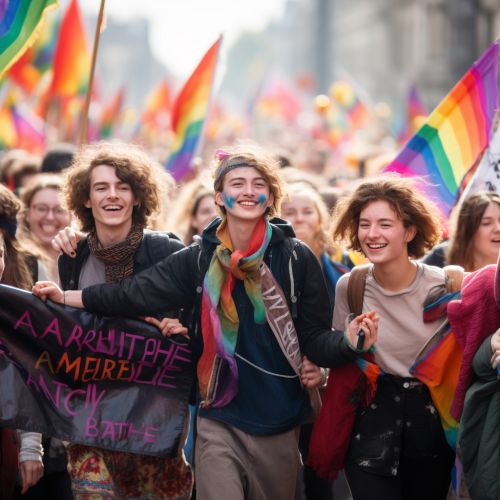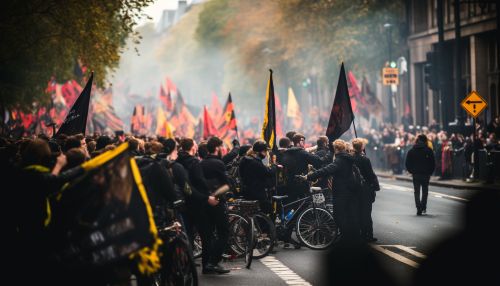Anarchism
Overview
Anarchism is a political philosophy and movement that rejects all involuntary, coercive forms of hierarchy. It calls for the abolition of the state which it holds to be undesirable, unnecessary, and harmful. The history of anarchism goes back to prehistory, when humans arguably lived in anarchistic societies long before the establishment of formal states, realms or empires.
Etymology and Terminology
The term anarchism derives from the ancient Greek word "anarkhia", meaning "without a ruler", composed of the prefix "an-" (i.e., without) and the word "arkhos" (i.e., leader or ruler). The suffix "-ism" denotes the ideological current that favours anarchy. Anarchism appears in English from 1642 as "anarchisme" and "anarchy" from 1539. Various factions within the French Revolution labelled their opponents as anarchists, although few such accused shared many views with later anarchists. Many revolutionaries of the 19th century such as William Godwin and Wilhelm Weitling would contribute to the anarchist doctrines of the next generation, but they did not use "anarchist" or "anarchism" in describing themselves or their beliefs.
History
The history of anarchism is as ambiguous as the definition of the term itself. The first known use of the term "anarchist" was in 1793, when French revolutionaries, the Enragés opposed to the Jacobins, were labeled "anarchists" by François Noël Babeuf. However, the term has been used to describe various philosophical and political ideas throughout history.
Prehistoric and Ancient World
Anthropologists have found complex, non-hierarchical societies in prehistory, and many indigenous peoples around the world have lived in such societies up to the present day. Some anarchists, such as Peter Kropotkin, have claimed these societies as examples of functioning anarchist societies. However, most contemporary anarchists do not consider the tribal model to be ideal.
Post-Industrial Revolution
The modern anarchist movement sprang from the secular or religious thought of the Enlightenment, particularly Jean-Jacques Rousseau's arguments for the moral centrality of freedom. From this climate William Godwin developed what many consider the first expression of modern anarchist thought. Godwin was, according to Peter Kropotkin, "the first to formulate the political and economical conceptions of anarchism, even though he did not give that name to the ideas developed in his work".
Anarchist Schools of Thought
Anarchism is a philosophy that embodies many diverse attitudes, tendencies and schools of thought; as such, disagreement over questions of values, ideology and tactics is common. Its diversity has led to widely different uses of identical terms among different anarchist traditions, which has led to many definitional concerns in anarchist theory.
Mutualism
Mutualism began in 18th-century English and French labour movements before taking an anarchist form associated with Pierre-Joseph Proudhon in France and others in the United States. This influenced individualist anarchists in the United States such as Benjamin Tucker and William B. Greene. Josiah Warren proposed similar ideas in 1833 after participating in a failed Owenite experiment.
Anarcho-Communism
Anarcho-communism advocates the abolition of the state, private property, and capitalism in favour of common ownership of the means of production, direct democracy and a horizontal network of voluntary associations and workers' councils with production and consumption based on the guiding principle: "From each according to his ability, to each according to his needs".
Anarcho-Syndicalism
Anarcho-syndicalism is a branch of anarchism that focuses on the labour movement. Anarcho-syndicalists view labour unions as a potential force for revolutionary social change, replacing capitalism and the state with a new society democratically self-managed by workers.
Anarchism and Violence
The use of violence has always been controversial within anarchism. While many anarchists during the 19th century embraced propaganda of the deed, Leo Tolstoy and other anarcho-pacifists directly opposed violence as a means for change. He argued that anarchism must by nature be nonviolent since it is, by definition, opposition to coercion and force, and that since the state is inherently violent, meaningful pacifism must likewise be anarchistic.
Anarchism Today
Today, anarchist groups are spread globally and have been influential around the world. Some of the main areas of focus in the anarchist movement today are labour organisation, ecology, feminism, education, the media, and peace.
See Also
Libertarianism Socialism Direct Democracy


